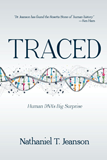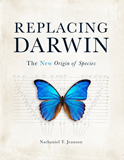Evolution Is a Scientific Law?
Dissecting a recent claim
“Evolution by natural selection is a scientific law and not just a theory.” No, this quote wasn’t lifted from an atheist blog or a Reddit rant. It’s not from an angry Facebook outburst either. Instead, it was the title of a recent academic paper.1
And, no, the authors weren’t conceding that evolution is just a theory in the popular sense. They gave no evidence of ever thinking that evolution is just a hypothesis or a guess. Rather, they used theory in the strict scientific sense—that evolution is supported by a wide body of evidence:
There is an overwhelming scientific consensus that both natural selection and evolution are real phenomena, yet there is disagreement about the extent to which natural selection dominates other evolutionary factors in producing inherited adaptations to either the physical or the biological environment, or both.2
In other words, the authors were not quibbling over whether evolution is a fact. Instead, their paper explored whether the fact of evolution happened unequivocally by means of natural selection—the survival of the fittest to reproduce—or by some other means (e.g., genetic drift, a type of statistical sorting). In short, the authors sought to resolve an intra-evolutionary quibble.
Academic purposes aside, the claims and assumptions of the paper still present a stark challenge to Bible-believing creationists. Theory, law, fact—all these descriptions of evolution fly in the face of the clear teaching of Genesis 1–11.
Are the authors’ claims true?
Boring Definitions, Explosive Implications
Thankfully, the authors supplied and elaborated on their term evolution by natural selection. In short, in their minds, evolution by natural selection is the process by which organisms reproduce, pass on variable traits, and compete for resources.3 It’s very similar to the definition I learned for the “process of evolution” in my college Biology 102 course. It’s also readily observable.
Uh oh. This means evolution is a fact, right?
Wrong. Why? Because evolution means different things in different contexts. In fact, I just pulled a sleight of hand myself in the preceding paragraphs. For Christians, evolution almost always conjures images of protoplasm turning into people over billions of years. This is the definition that directly contradicts Scripture. It’s also the type of evolution that has never been directly observed.
This is a big deal. The most basic criterion of scientific fact is observation. It’s a bit difficult to advance something as a scientific fact when it fails to meet this fundamental standard.
The other definition of evolution is the “process of evolution” that I described above. It finds no contradiction in the Bible. In fact, it’s something that I freely invoke to explain how the kinds on board Noah’s ark multiplied into tens of thousands of species today.
The authors of the paper happily conflate the two definitions. In their minds, the process of evolution—over billions of years—naturally produces people from protoplasm. No need to bother making a distinction where the natural world smoothly blends one definition into another.
In their minds, the process of evolution—over billions of years—naturally produces people from protoplasm.
Evidence
Why do the authors think this way? Their paper doesn’t focus on this question. But their position mirrors the standard mainstream one. From the latter, the answer is clear.
For example, textbooks teach a ready set of evidences. The classification of life, the nature of the fossil record, the similarities among diverse creatures, and more constitute the typical package that evolutionists present as proof that protoplasm-to-people is a fact.
It’s also one of the worst possible approaches that they could take. In short, as I show in Replacing Darwin, each of these evidences fits the expectations of Scripture equally well—if not better. In other words, the classic “evidences” for protoplasm-to-people evolution fail to distinguish between evolution and creation.
This state of affairs would be big news on its own. But it gets better—for creationists.
It’s not just that creationists have successfully pushed back against protoplasm-to-people evolution. It’s also that creationists have surpassed evolution and taken the scientific lead.
For example, creationist ideas successfully predicted the formation of a new species—both the rate of its formation and the mechanism by which it formed. And not just any species. Creationist predictions were fulfilled on one of the poster children for evolution, one of Darwin’s finches on the Galápagos Islands.
The biggest arena for creationist success has been the origin of our own species, Homo sapiens. We now can read off the history of civilization in our own DNA. But only when we read the DNA in the context of just 4,500 years of history since Noah. Even better, we’ve found the DNA-based replica of the Genesis 10 genealogy. In other words, it’s not just that the evidence fails to support people evolving from protoplasm. It’s also that the evidence strongly confirms biblical anthropology.
The Puzzle
“Why don’t more people accept what you’re saying? Why doesn’t the mainstream scientific community believe you?” It’s a common question. With a little reflection, it’s also easy to answer. For most scientists, the mainstream education system bends over backward to ensure that students—from kindergarten through graduate school—are never exposed to creationist thinking, evidences, and discoveries.4
In other words, protoplasm-to-people evolution isn’t a scientific law.
In other words, protoplasm-to-people evolution isn’t a scientific law. In fact, the opposite is true; it’s already been disproven. But law does apply to the discussion of evolution. The legal law maintains the dominance of evolution in the classroom.
By keeping the competition out.
Footnotes
- Daniel J.M. Crouch and Walter F. Bodmer, “Evolution by Natural Selection Is a Scientific Law and Not Just a Theory,” Academia Biology 2 (2024): https://doi.org/10.20935/AcadBiol6158.
- Crouch and Bodmer, “Evolution by Natural Selection,” 4.
- I.e., see page 1 of Crouch and Bodmer, “Evolution by Natural Selection.”
- For the few scientists who do expose themselves to creationist ideas, the explanations tend to be a bit darker. E.g., see the following:
https://answersingenesis.org/theory-of-evolution/when-evolutionists-help-creationists-make-their-case/
https://answersingenesis.org/theory-of-evolution/when-evolutionists-help-creationists-make-their-case-part-2/
https://answersingenesis.org/theory-of-evolution/when-evolutionists-help-creationists-make-their-case-part-3/
Recommended Resources

Answers in Genesis is an apologetics ministry, dedicated to helping Christians defend their faith and proclaim the good news of Jesus Christ.
- Customer Service 800.778.3390
- Available Monday–Friday | 9 AM–5 PM ET
- © 2026 Answers in Genesis






